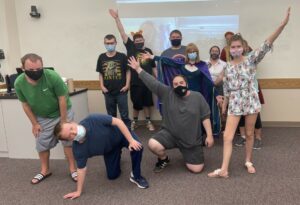Blogging with Brendan: Theatre for Life
Like many other great QCT education programs that I (unfortunately) cannot take credit for, our partnership with College for Life was well-established prior to my arrival in Quincy. I was asked by Brandon to teach a course in the College for Life (CFL) 2020 fall semester, one which I had the freedom to develop to best suit CFL’s needs. I admit I was somewhat apprehensive at first, as I had limited experience working with CFL’s very specific student body. College for Life, which is housed at John Wood Community College, provides higher education and life skills for adults with intellectual or developmental disabilities, or IDD.
I’m now in the midst of my third semester teaching at College for Life, and can safely say that it has been one of the most rewarding experiences of my career—one that consistently challenges my assumptions about theatre and its capacity for transformation. And if anyone required further proof that theatre education provides essential skills for living, they need look no further than our classroom at John Wood.
 College for Life is one of those rare programs that not only cites inclusion as a core value, but also demonstrates its commitment to a truly inclusive world both inside and outside the classroom. As the spectrum of IDD is vast, each student comes into the program with highly individual needs and learning styles. Some students have difficulty reading and writing, others are great readers but struggle with comprehension, still others find social interaction and relationship-building exceedingly difficult to navigate. All have the same goal as students in traditional higher education—to acquire, through hard work and study, the tools for future success, independence and access to a full life. We’ve seen how theatre education can provide some of those tools—chiefly collaboration and creative problem solving; for the IDD community, the tools of theatre take on renewed significance and utility.
College for Life is one of those rare programs that not only cites inclusion as a core value, but also demonstrates its commitment to a truly inclusive world both inside and outside the classroom. As the spectrum of IDD is vast, each student comes into the program with highly individual needs and learning styles. Some students have difficulty reading and writing, others are great readers but struggle with comprehension, still others find social interaction and relationship-building exceedingly difficult to navigate. All have the same goal as students in traditional higher education—to acquire, through hard work and study, the tools for future success, independence and access to a full life. We’ve seen how theatre education can provide some of those tools—chiefly collaboration and creative problem solving; for the IDD community, the tools of theatre take on renewed significance and utility.
As the world strives to be more inclusive, more opportunities emerge for our College for Life students to enter the workforce, pursue creative arts and live a fulfilling, productive life. They must learn to be open to collaborating with peers, employers and members of the community with different abilities, expectations or prejudices. They will encounter profound problems in navigating the world that, to a developmentally normative person, seem easily surmountable. These challenges require creativity and adaptive thinking to overcome. Perhaps most importantly, our students need to be empowered to tell their story. My College for Life students are the most uniquely individual people I’ve had the pleasure to teach, and their voices deserve to be amplified—if for no other reason than to announce their presence to the world, and their capacity to be extraordinary. Theatre is the domain of the storyteller. It, too, strives to be fully inclusive. It wasn’t until I became immersed in the College for Life program that I came to understand how inclusion and the transformative power of arts education are fundamentally linked.
Take, for example, QCT’s fall 2021 College for Life course, “Everyday Scripts.” The concept of the course is to use playwriting instruction to model everyday situations for our students and “script out” interactions with the service industry, healthcare workers, or social acquaintances (to name a few). Like a typical playwriting class, we identify the constituent parts of a play before we get to writing—plot,
character, dialogue, setting, objective and conflict. We identify each of these elements within the context our weekly real-life scenario (going to the movies, for example); for us, the most germane part of the play is the connection between objective and conflict. As we work together to write our “everyday script,” we brainstorm how our characters (as avatars for our students) can overcome, pivot or sometimes just accept the real conflicts that arise in these situations. Our objective could be to purchase a ticket for the correct show time, select our seat and enjoy a film in peace. A conflict that might arise in that “script” is the presence of disruptive audience members nearby. What actions could our characters take? Like a playwright, we problem solve and model those solutions on the page—the safe environment of the classroom enables us to experiment, to dream, and most of all to prepare. For IDD students, writing the script for such a scenario (who among us hasn’t experienced something similar?) develops ingenuity; the final step, acting out the script, develops confidence and independence. Playwriting is transformed into preparation for life.
As QCT continues its partnership with College for Life, more opportunities for transformation emerge. CFL’s leader, Michele Westmaas, challenges us to dream up new curriculum concepts, new connections between the theatre and education, and new ways to celebrate the diverse, individual stories of this extraordinary group of students. Through our collaboration, we continue our journey toward a true Theatre for Life.
